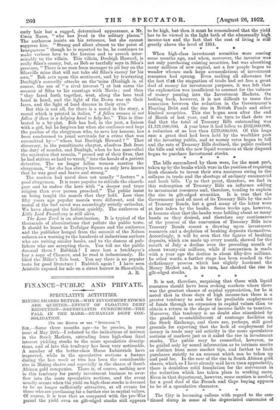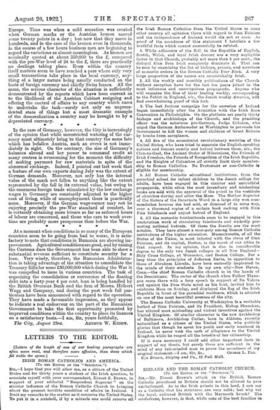FINANCE—PUBLIC AND PRIVATE.
SPECULA.11Vh ACTIVITIES.
MINING SHARES BETTER—WHY INVESTMENT STOCKS ARE QUIETER—EFFECT OF FLOATING DEBT REDUCTION—DEPRECIATED CURRENCIES—THE FALL IN THE MARK—RUMANIAN DEBT CON- SOLIDATION.
[To THE EDITOR OF THE "SPECTATOR."]
Slit,—Some three months ago—to be precise, in your issue of May 20th—I referred to the indications of interest in the Stock Markets, extending from high-class fixed interest yielding stocks to the more speculative descrip- tions, and of late this tendency has been very noticeable. A number of the better-class Home Industrials have improved, while in the speculative sections a feature during the last week or two has been the considerable rise in Mining shares and especially in the shares of South African gold companies. There is, of course, nothing new in this tendency for purely investment business to over- flow into the more speculative sections, and the event usually occurs when the yield on high-class stocks is deemed to be no longer sufficiently attractive, at all events for those who are purchasing for a further rise in capital values. Of course, it is true that as compared with the pre-War period the yield even on gilt-edged stocks still appears to be high, but then it must be remembered that the yiel4 has to be viewed in the light both of the abnormally high income-tax and the fact that the cost of living is still greatly above the level of 1914.
. When high-class investment securities were soaring some months ago, and when, moreover, the investor was not only purchasing existing securities, but was absorbing many millions of new capital, not a few people began to wonder whence such large accumulations of investment resources had sprung. Even making all allowance for the fact tlat the stagnation of trade had set free a great deal of money for investment purposes, it was felt that the explanation was insufficient to account for the volume of money pouring into the Investment Markets. On looking back, however, it is not difficult to trace the connexion between the reduction in the Government's Floating Debt .and the rise in British Funds and other kindre securities. This rise began soon after the end of March of last year, and if we turn to that date we find that the total of Treasury Bills outstanding was £1,121,000,000. A year later it had fallen to £882,000,000, a reduction of no less than 1239,000,000. Of this huge sum a great deal had been held by the wealthier part of the investing public, and as money rates began to fall and the rate of Treasury Bills declined, the public realized the bills and with the new liquid resources at their disposal began to purchase Investment stocks.
The bills surrendered by them were, for the most part, taken up by the banks which were in the position of requiring fresh channels to invest their own resources owing to the collapse in trade and the shortage of ordinary commercial and bank bills. Up to that point, therefore, we find in this redemption of Treasury Bills an influence adding to investment resources and, therefore, tending to explain the rise in gilt-edged securities. It is true that the Government paid off most of its Treasury Bills by the sale of Treasury Bonds, but a good many of the latter were at first taken by the banks. Some weeks ago, however, it became clear that the banks were holding about as many bonds as they desired, and therefore any continuance of the process of the conversion of Treasury Bills into Treasury Bonds meant a drawing upon investment resources and a depletion of baiaki g deposits themselves. Accordingly, it will be seen that the figures of banking deposits, which are made up every month, showed for the month of July a decline over the preceding month of about twenty-six millions, while if comparison is made with a year ago the decline is about fifty-five millions. In other words, a further stage has been reached in the deflationary process which has slightly hardened the Money Market and, in its turn, has checked the rise in gilt-edged stocks.
It is not, therefore, surprising that those with liquid resources should have been seeking markets where there was the greatest chance of capital appreciation, for be it noted that in these days of high income-tax there is a greater tendency to seek for the profitable employment of funds through an expansion in capital values than to obtain a return in the shape of income liable to taxation. Moreover, this tendency is no doubt also stimulated by the gradual re-establishment of contango facilities on the Stock Exchange, and there are, perhaps, still good grounds for expecting that the lack of employment for money in trade may aid activity in the more speculative sections of markets Just as it aided the rise in investment stocks. The public may be counselled, however, to be guided only by sound information as to intrinsic merits as distinct from mere market tips, and further to limit purchases strictly to an amount which can be taken up and paid for. In the case of the rise in South African gold shares, which as I have already said have risen appreciably, there is doubtless solid foundation for the movement in the reduction which has taken place in working costs. Even in that department, however, some caution is needed, for a good deal of the French and Cape buying appears to be of a speculative character.
The City is becoming callous with regard to the con. tinned slump in some of the depreciated currencies of Europe. Time was when a mild sensation was created when German marks or the Austrian kronen moved some twenty points in a day ; but now that they move in hundreds, and in the case of the kronen even in thousands, in the course of a few hours business men are beginning to regard the variations as almost meaningless. As kronen are nominally quoted at about 350,000 to the 1, compared with the pre-War level of 24 to the 1, there are practically no dealings taking place. Even within the country itself matters seem to have reached a pass where only very small transactions take place in the local currency, any- thing of a larger nature being usually conducted on the "'axis of foreign currency and chiefly Swiss francs. All the same, the serious character of the situation is sufficiently demonstrated by the reports which have been current as to the likelihood of the Austrian Cabinet resigning and offering the control of affairs to any country which cares to undertake the task—surely not only an unprece- dented state of things but a most dramatic example of the demoralization a country may be brought to by a depreciated currency.
In the case of Germany, however, the City is increasingly of the opinion that while unrestricted watering of the cur- rency must ultimately bring to that country the same fate which has befallen Austria, such an event is not imme- diately in sight. On the contrary, the size of Germany's balances abroad and her power to command credit at many centres is overcoming for the moment the difficulty of making payment for raw materials in spite of the abnormal exchange. Indeed, I pointed out last week that a feature of our own exports during July was the extent of German demands. Moreover, not only has the internal value of the mark not fallen to anything like the extent represented by the fall in its external value, but owing to the enormous foreign trade stimulated by the low exchange wages in Germany are constantly adjusted to the higher cost of living, while of unemployment there is practically none. Moreover, if the German wage-earner may not be enjoying precisely the pre-War standard of comfort, he is certainly obtaining more leisure so far as enforced hours of labour are concerned, and those who care to work over- time are probably more prosperous than before the War.
At a moment when conditions in so many of the European countries seem to be going from bad to worse, it is satis- factory to note that conditions in Rumania are showing im- provement. Agricultural conditions are good, and by raising the Customs dues the Government has been able to show a substantial revenue sufficient to constitute security for a loan. Very wisely, therefore, the Rumanian Administra- tion is taking advantage of the situation to consolidate the Treasury Bills for some 130,000,000 which during the War it was compelled to issue in various countries. The task of organizing the consolidation or conversion of the floating debt into a forty-year 4 per cent. loan is being handled by the British Overseas Bank and the firm of Messrs. Helbert Wagg and Company, and during the past week full par- ticulars have been announced with regard to the operation. They have made a favourable impression, as they appear to indicate a real endeavour on the part of the Rumanian Government to take the first opportunity presented by improved conditions within the country to place its finances on a satisfactory basis.—I am, Sir, yours faithfully,



































 Previous page
Previous page